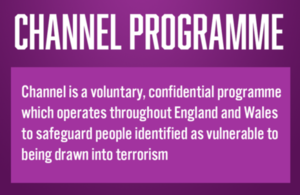The Channel programme
Channel is a confidential, voluntary multi-agency safeguarding programme that supports people who are vulnerable to radicalisation.

Channel programme
Channel is a confidential, voluntary multi-agency safeguarding programme that supports people who are vulnerable to radicalisation.
It is run in every local authority in England and Wales and addresses all types of extremism including the extreme-right and Islamist-related. It is about early intervention to protect vulnerable children and adults who might be susceptible to being radicalised, which, if left unsupported, could lead to involvement in terrorist-related activity.
Anyone can make a referral if they are concerned about someone being radicalised. Referrals from the general public can be made to the local authority or the local police. The Channel panel – which is chaired by the local authority - and made up of representatives from different safeguarding areas including health, education, and the police– will meet to discuss the nature and extent of the potential vulnerability of the individual.
All referrals are carefully assessed. Sometimes the person doesn’t need any help at all, and the referral is closed. In other cases, the panel will offer the individual an appropriate support package tailored to their needs.
Support could include assistance with education or employment, health support, and ideological mentoring to provide vulnerable individuals with the skills to protect themselves from being drawn into committing terrorist-related activity or supporting terrorism.
Below are just a few examples of real stories of individuals who have received support through Channel:
Yusuf was seen handing out leaflets promoting a website containing extremist, homophobic and violent material
Yusuf was at University and was aged 24 when a university staff member saw him handing out leaflets which, it turned out, were promoting a website containing extremist, homophobic and violent material. She got in touch with the university Prevent coordinator who contacted the police. Yusuf was spoken to by student services and police, who felt that he was at risk of being drawn into terrorism. Yusuf had become befriended by older radicalised men through late night discussions and weekend meetings and started to identify with extremist ideology, but he was confused. Yusuf began to move away from extremism after receiving chaplaincy and psychological support through Channel. He has now successfully completed his studies.
Amina was reported to police about her intention to travel to Syria
Amina was in her late teens when a report was made to the police about her intention to travel to Syria. Amina had a deeply troubled life with her parents having been engaged in domestic violence. Her parents broke up and she lived with her father. She was lonely. No friends. She was also subjected to a serious assault. All these issues made her turn to religion for answers. But the religious guidance she sought online was uncontrolled. Her social media indicated that she had voiced support for Daesh and a hatred for non-Muslims. Support through Channel enabled Amina to rebuild her relationship with her mother. A female counsellor addressed issues around religion, politics and self-esteem. Amina is now enjoying her new found life.
Callum’s teacher became aware of his involvement in promoting the far-right on Facebook
Callum was a teenager whose teacher became aware of his involvement in promoting a far-right Facebook page which had upset another student. He had been invited to “secret” group meetings connected to football games. Without family influence around he was getting attention and social support through his involvement in this group. He said he didn’t have a problem with most people - just Muslims: Muslims were not like “us”. He said he’d watch them all “doing their Sharia law.” Through the Channel process, the school worked with the police, social care and a local youth group to support him through challenging the ideology he had developed, providing him with careers advice, and connecting him to an ethnically diverse local youth group. His confidence grew, as did the bond with his family. He dismissed the ideology that he had connected himself to and realises he had been heading down the wrong path.
Statistics on individuals referred to and supported through the Prevent Programme.
Updates to this page
-
Link at the bottom of the page updated.
-
Link added to statistics for individuals referred to and supported through the Prevent Programme, April 2016 to March 2017.
-
First published.